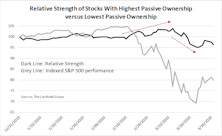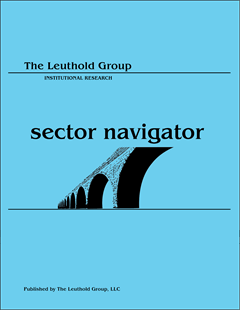Active vs. Passive
Active Managers Love Bears
Our analysis has consistently affirmed that actively managed portfolios do relatively better against their benchmarks during weaker market settings. In terms of active vs. passive, portfolio managers should love bearish environments, and third-quarter returns held true to that notion.
Active/Passive Whiplash
The active/passive performance derby experienced a severe case of whiplash the last three months. Through the end of the first quarter, market conditions were advantageous for active managers, now the second quarter has revealed a massive shift in favor of passive styles.
Active/Passive: Data Refresh Through Q1-2023
The performance derby between actively managed portfolios and passively managed index funds is a fascinating and important topic in the investment community at large. This note provides a brief update our previous studies through the first quarter of 2023.
Active Managers Embrace The Bear
The fourth quarter of 2022 saw broadly positive equity-market performance with the S&P 500 returning +7.6%, the Russell 1000 Mid Cap Index at +7.2%, and the Russell 2000 Small Cap Index gaining 6.2%. Strong returns usually present a headwind for active managers, but the fourth quarter proved productive for actively managed funds.
Fair Winds For Active Managers
The defining characteristic of last year’s bear market was the collapsing valuations of speculative growth stocks. A mania for themes such as cloud computing and disruptive innovation during 2016-2021 drove those names to fantastical valuations and bestowed market capitalizations of tens- and even hundreds of billions of dollars on such companies, many of which had yet to turn a profit.
The Active/Passive Performance Cycle Second Quarter 2022 Update
The performance derby between actively-managed portfolios and passively-managed index funds is a topic of ongoing interest for Leuthold clients and the investment community at large. Therefore, we are providing an update to all charts and tables of our Active/Passive performance analyses.
Active Vs. Passive Return Drivers: Update Through December 2021
Our ongoing research into the relative performance of active vs. passive fund styles reveals that market conditions play a significant role in the active/passive return cycle. Accordingly, we identified a set of metrics that describe the market conditions we believe influence which of the two management styles is more likely to outperform. This note updates our research efforts through December 31, 2021.
Schrödinger’s Style Box
The performance derby between actively managed portfolios and passive benchmarks is strongly influenced by market conditions. Active manager success rates are cyclical, but not random, and are driven by slippage created from style, size, and weighting considerations that result from the imperfect slotting of active portfolios into single style boxes. Moreover, this slippage can be defined and measured, and shows a clear correlation with relative return spreads between benchmarks and their opposite boxes.
Research Preview: Is “Manager Skill” Cyclical?
The active-passive performance derby is cyclical, determined not by the ebb and flow of portfolio managers’ brilliance but, rather, by market conditions and the slippage that arises from imperfectly comparing funds and benchmarks.
Active Vs. Passive Return Drivers March 2021 Update
Our ongoing research into the relative performance of active vs. passive styles reveals that market conditions play a significant role in the active/passive return cycle. We identified a set of metrics that describe the market conditions we believe influence which management style is more likely to outperform. This note updates our data through March 2021.
The Active Goose, The Passive Gander
Raise your hand if you’ve heard this one before:
(A) 80% of active funds underperformed their index over the past 10 years.
Now, keep your hand up if you have also heard this:
(C) Therefore, investors should buy passive index funds.
Is Passive Ownership Exacerbating The Sell-Off?
With the enormous popularity of ETFs, we’ve wondered if the high level of passive fund ownership could lead to stock price deviation from company fundamentals, and thus create greater price volatility.
John Bogle: Investment Philosopher
The passing of investment legend John Bogle has brought forth many well-deserved tributes to his professional accomplishments. He was a tireless champion of passive investing and the founder of The Vanguard Group which, as more than a few investors don’t realize, also manages almost $1 trillion in active funds.
Active vs. Passive Return Drivers - June 2018 Update
Our ongoing research into the relative performance of Active vs. Passive fund styles is based on the belief that just as market conditions cycle, so does the active-passive return spread.
Active vs. Passive Return Drivers: Updated Through Year-End 2017
Our ongoing research into the relative performance of Active vs. Passive fund styles is based on the belief that just as market conditions cycle, so does the active-passive return spread..
Actively Bearish, Passively Bullish?
Relative performance of active and passive mutual funds is one of the leading story lines in our industry, with passive’s recent advantage leading some to argue that it will be the dominant style forevermore. We disagree, and believe that the active/passive relationship has been, and always will be, cyclical.
Active/Passive Return Drivers: July 2017 Update
Last July we published a study titled Active vs. Passive: A Three-Club Headwind that examined the recent performance advantage of passive indexes over actively managed funds.

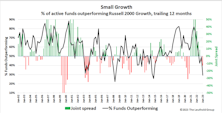


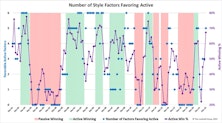
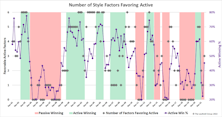
.jpg?fit=fillmax&w=222&bg=FFFFFF)
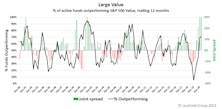
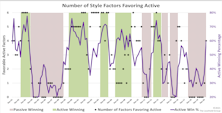
.jpg?fit=fillmax&w=222&bg=FFFFFF)

